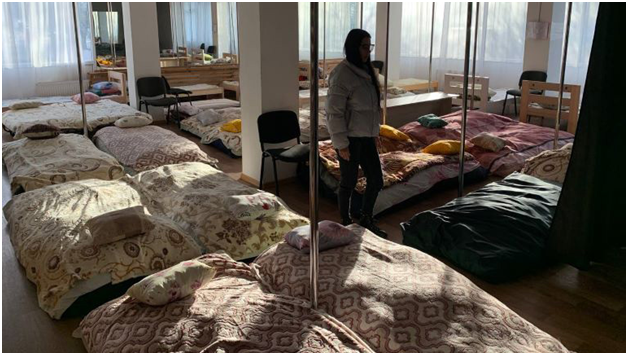How Trade Union members are supporting Ukrainians
With 90 per cent of construction workers out of work in Ukraine, the Construction and Building Materials Industry Workers' Union (PROFBUD) has found new ways to help its members and the rest of the population survive the hostilities.
Since the onset of the Russian aggression, PROFBUD mobilised to support its members and Ukrainian workers: it launched new services including humanitarian assistance and provided shelter and medical support for internally displaced persons (IDPs), providing 505,000 bednights in trade union facilities since the beginning of March. It has also given financial assistance to unionised workers, 30,000 of them having not received a salary since the end of February.
In these difficult circumstances, PROFBUD members like Oleh, Galyna and Kateryna have found a new purpose in life serving their community.
Oleh Skovorodnikov and the shelter in Khmelnytskyi
Oleh, the head of PROFBUD in the Khmelnytskyi region, in Western Ukraine, one of the biggest transit regions for internally displaced persons, realized on the second day of the conflict that he needed to provide shelter for workers and their families who were fleeing the areas under attack. With the help of PROFBUD, who rapidly mobilized foreign trade unions, charitable organizations and individuals willing to provide donations, he turned the local union training center “Pobuzhzhyia” into a provisional residence. Oleh was able to create 145 temporary living spaces for families, and another 100 temporary accommodations, and provided them with food.
Galyna Bondarchuk finds vital medicines for unionists
When the war broke out, Galyna Bondarchuk, head of PROFBUD in the Kyiv region, stayed in a village outside the capital with her family. When it became obvious that it was not safe for them to remain there, with Russian troops advancing fast, the family took the risk of crossing the city and spent three days on the road, sleeping in their car. Upon arrival to Lviv, the family settled in the apartment of a colleague from a local plant.
After her gruelling experience, Galyna decided that she wanted to help her fellow unionists who were worse off. She started searching for medicines that were unavailable in occupied regions and in the process started to learn all about them, basically becoming a ‘personal pharmacist’ for unionists all over Ukraine. Her help has been essential for those who would not have survived without their medication.



